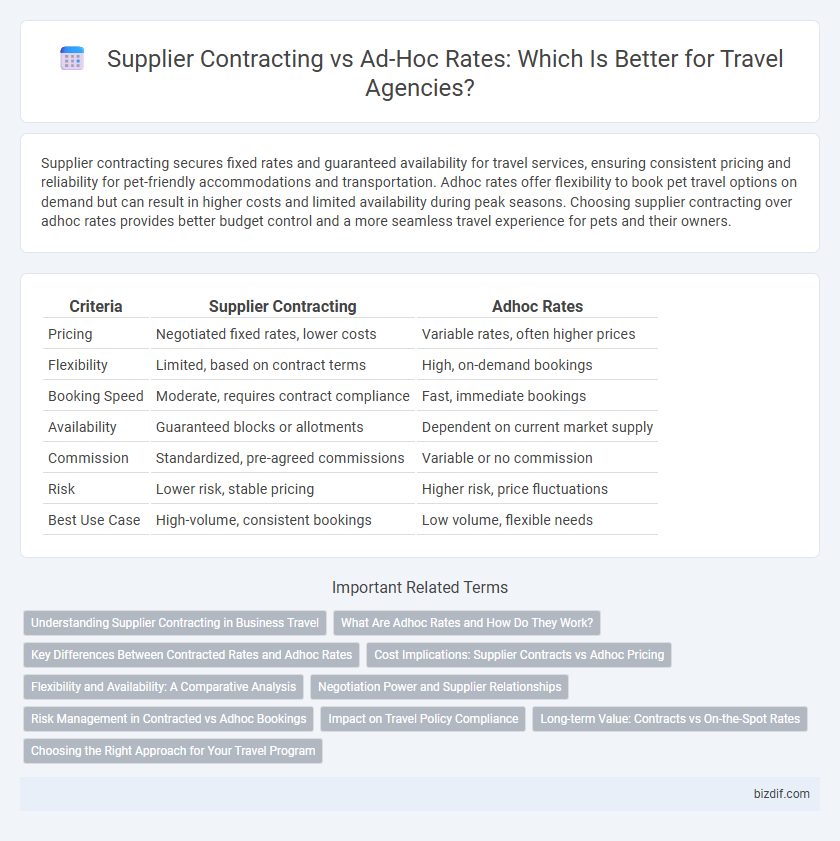Supplier contracting secures fixed rates and guaranteed availability for travel services, ensuring consistent pricing and reliability for pet-friendly accommodations and transportation. Adhoc rates offer flexibility to book pet travel options on demand but can result in higher costs and limited availability during peak seasons. Choosing supplier contracting over adhoc rates provides better budget control and a more seamless travel experience for pets and their owners.
Table of Comparison
| Criteria | Supplier Contracting | Adhoc Rates |
|---|---|---|
| Pricing | Negotiated fixed rates, lower costs | Variable rates, often higher prices |
| Flexibility | Limited, based on contract terms | High, on-demand bookings |
| Booking Speed | Moderate, requires contract compliance | Fast, immediate bookings |
| Availability | Guaranteed blocks or allotments | Dependent on current market supply |
| Commission | Standardized, pre-agreed commissions | Variable or no commission |
| Risk | Lower risk, stable pricing | Higher risk, price fluctuations |
| Best Use Case | High-volume, consistent bookings | Low volume, flexible needs |
Understanding Supplier Contracting in Business Travel
Supplier contracting in business travel involves negotiating fixed agreements with hotels, airlines, and ground transportation providers to secure preferred rates and guaranteed availability. These contracts often include volume discounts and customized service levels, which enhance cost predictability and streamline booking processes for corporate clients. Unlike adhoc rates that fluctuate based on market demand, supplier contracting ensures consistent pricing and improved supplier relationships essential for managing large-scale business travel programs.
What Are Adhoc Rates and How Do They Work?
Adhoc rates are flexible pricing agreements set by travel suppliers for agencies without long-term contracts, allowing access to inventory at variable prices based on demand and availability. These rates enable travel agencies to offer competitive deals on flights, hotels, or tours when supplier-specific contracts are unavailable or impractical. Travel agencies leverage adhoc rates to quickly respond to market fluctuations and customer preferences, maximizing bookings while managing costs effectively.
Key Differences Between Contracted Rates and Adhoc Rates
Contracted rates are pre-negotiated prices agreed upon between travel agencies and suppliers, ensuring consistent pricing and availability, while adhoc rates fluctuate based on real-time demand and supplier discretion. Contracted rates offer stability and often include added benefits such as commissions and exclusivity, whereas adhoc rates provide flexibility but carry a higher risk of price variability. Understanding these differences helps travel agencies optimize cost management and improve client satisfaction through strategic supplier partnerships.
Cost Implications: Supplier Contracts vs Adhoc Pricing
Supplier contracting offers fixed rates that help travel agencies stabilize costs and plan budgets with greater accuracy, reducing the risk of sudden price fluctuations. Adhoc rates can provide flexibility for unique or last-minute bookings but often come with higher prices and unpredictable cost variations, impacting overall profitability. Consistent supplier contracts enable agencies to negotiate volume discounts and streamline expenses, whereas adhoc pricing may lead to increased operational costs and lower margin control.
Flexibility and Availability: A Comparative Analysis
Supplier contracting in travel agencies ensures consistent availability and negotiated flexibility in rates, enabling reliable service delivery and cost control. In contrast, adhoc rates offer higher flexibility for last-minute bookings but often lack guaranteed availability and may result in unpredictable pricing. Balancing supplier contracts and adhoc arrangements maximizes operational efficiency and customer satisfaction by aligning flexibility with dependable access to resources.
Negotiation Power and Supplier Relationships
Supplier contracting ensures consistent negotiation power by establishing long-term agreements with suppliers, resulting in more favorable rates and priority access to inventory. Adhoc rates lack stability, limiting leverage in price discussions and making supplier relationships more transactional and less collaborative. Strong supplier relationships built through contracting encourage tailored offers and reliability, crucial for competitive travel packages.
Risk Management in Contracted vs Adhoc Bookings
Contracting with suppliers reduces risk through fixed rates and guaranteed availability, ensuring cost control and service reliability. Adhoc bookings carry higher risk due to price fluctuations and limited inventory, potentially causing budget overruns and service inconsistencies. Effective risk management favors supplier contracts to secure stable pricing and minimize operational disruptions in travel planning.
Impact on Travel Policy Compliance
Supplier contracting ensures consistent pricing and availability, which directly improves travel policy compliance by enforcing negotiated rates and preferred partners. Adhoc rates introduce variability and can lead to employees selecting non-compliant options, increasing costs and risk of policy violations. Implementing supplier contracts strengthens control over travel expenses and ensures alignment with organizational travel policies.
Long-term Value: Contracts vs On-the-Spot Rates
Supplier contracting in travel agencies ensures stable, negotiated rates and guaranteed availability, fostering long-term partnerships that boost profitability and customer satisfaction. Adhoc rates offer flexibility for immediate bookings but often come with higher costs and inconsistent pricing, limiting budget predictability. Long-term contracts optimize operational efficiency and cost control, providing strategic advantages over spot market volatility.
Choosing the Right Approach for Your Travel Program
Selecting between supplier contracting and adhoc rates depends on the travel program's volume, consistency, and budget flexibility. Supplier contracting offers negotiated, often discounted rates with guaranteed availability, ideal for high-volume or frequent travel needs. Adhoc rates provide flexibility without commitment, better suited for infrequent or varied travel patterns that require cost control without long-term contracts.
Supplier Contracting vs Adhoc Rates Infographic

 bizdif.com
bizdif.com